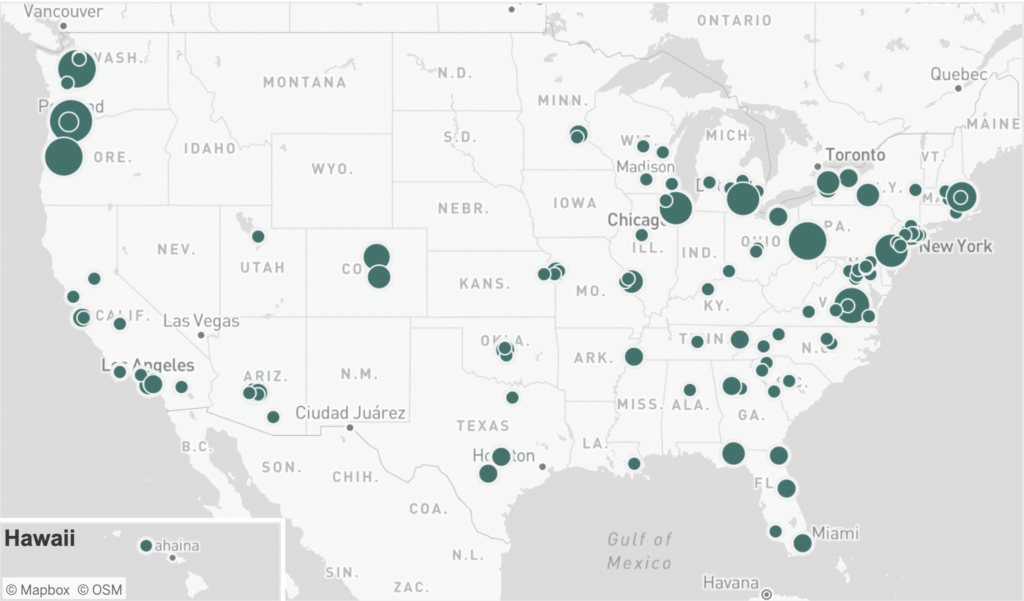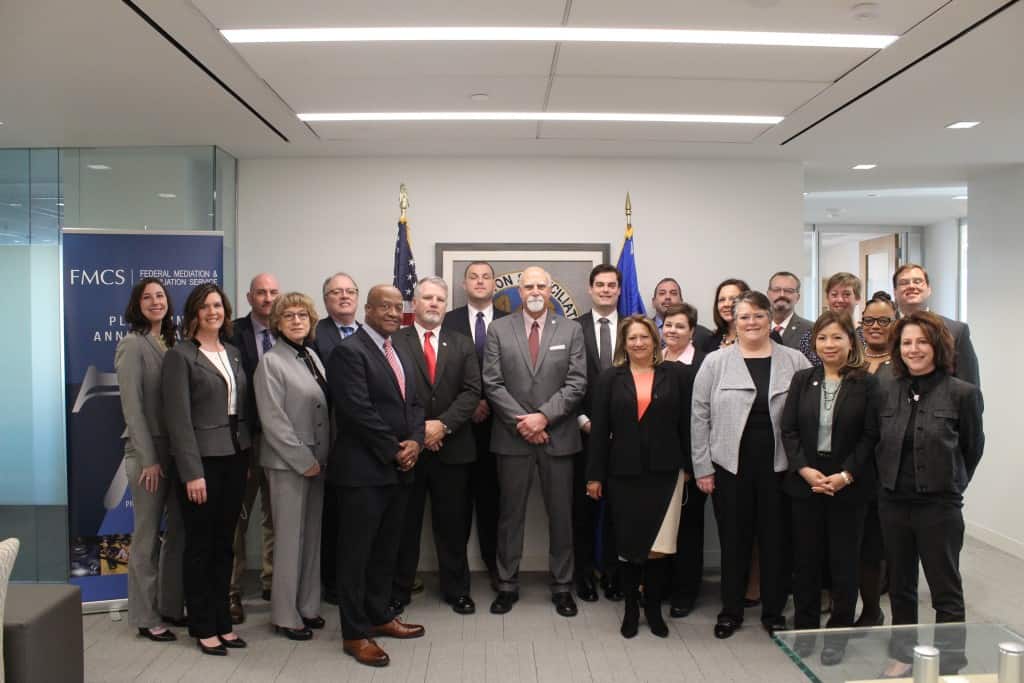
Tascha Shahriari-Parsa is a government lawyer enforcing workers’ rights laws. He clerked on the Supreme Court of California after graduating from Harvard Law School in 2024. His writing on this blog reflects his personal views only.
Over the last two days, the the Federal Mediation and Conciliation Service (FMCS) and the National Labor Relations Board (NLRB) announced big changes in the two agencies’ practices that can help facilitate unionization and collective bargaining.
First, on Tuesday, FMCS launched its new free card check services in furtherance of the recommendations of the White House Task Force on Worker Organizing and Empowerment’s February Report. These services allow workers interested in unionization—along with employers that are open to voluntary card check recognition—to move forward with a card check process that is overseen by the FMCS. The FMCS program is voluntary and does not mandate automatic union recognition when a majority of employees sign union cards, as the Employee Free Choice Act would have. However, the new program may give card check greater legitimacy and encourage more voluntary card check recognitions in lieu of tradition NLRB elections.
Compared to NLRB elections, card check is generally more expedient and less costly to unions and employers alike. Card check also has a greater potential to avoid the acrimony that marks most union elections, leaving a greater door open for better labor-management relations. Despite these advantages, employers often argue that card check processes allow unions to intimidate employees to sign cards—even though data demonstrates that, according to workers themselves, any such coercion that takes place by unions is likely minimal in comparison to coercion by employers. FMCS’s free and neutral card check services could make it much harder for employers to make this argument, as employers would have to now explicitly repudiate a process overseen by a neutral federal agency in order to insist on NLRB elections. Only time will tell the extent to which the FMCS’s new practice will lead to the greater use of card check by unions.
Subsequently, yesterday, NLRB General Council Jennifer Abruzzo announced that the NLRB will be making greater efforts to partner with FMCS to promote collective bargaining. The White House Task Force Report on Worker Organizing included a recommendation encouraging the NLRB and FMCS “to work more closely together to facilitate worker organizing and collective bargaining.” In furtherance of this recommendation, Abruzzo’s memo asks regional offices to (1) send a notice on FMCS initial contract bargaining support resources to unions and employers after certification; (2) send a similar notice to unions and employers where a bad faith bargaining unfair labor practice allegation has been filed; and (3) seek remedies in bad faith bargaining cases that ask for an FMCS mediator to help facilitate good-faith bargaining between the parties or conduct trainings on collective bargaining. The aforementioned FMCS resources include skills development training for collective-bargaining, education on contract administration, and mediation.
Former NLRB chair and senior research associate of the Harvard Labor and Worklife Program Wilma Liebman believes that “the government is trying to figure out how to use its existing resources, absent some statutory changes, to facilitate increasing worker power, worker voice.” Liebman emphasized the NLRB and FMCS’s efforts to facilitate the negotiation of first-contracts, which can present an enormous hurdle for unions under existing labor law. Sarah Cudahy, a senior official in FMCS, stated that the agency is excited to spread the message about how the agency can assist parties before, during, and after negotiations, and help them “come to a mutually agreeable solution.”
In other news, last week, the state of Washington defeated a lawsuit by a group of employers that challenged WA Care on the basis that it is preempted by federal law. WA Care is a state program that requires employers to deduct 0.0058% from workers’ paychecks and put that amount in a long-term care fund, which would provide eligible individuals in need of assistance with up to $100 a day. According to Washington, the program could save the state’s Medicaid program nearly a billion dollars over a span of two years. A group of employers sued Washington in federal court, arguing that WA Care was preempted by the federal Employee Retirement Income Security Act (ERISA). U.S. District Court Judge Thomas Zilly concluded in an order last week that there was no preemption by ERISA, because WA Cares is not an “employee benefit plan” that would be governed by the federal statute. “WA Cares is a creation of the Washington Legislature, which, in this context, is neither an employer nor an employee organization as defined by ERISA.”
Workers at a Jack in the Box in Sacramento walked off the job on Tuesday in protest of management’s failure to protect workers from threats to their safety. After a pregnant worker was threatened at gunpoint during a robbery at the Jack location, management allegedly refused to allow the worker to go home and cut the worker’s hours when she refused to finish her shift. A California-based report from the end of last year highlights that this is not an isolated incident: “violent activity at fast-food restaurants across California generates tens of thousands of 911 calls a year,” violence which “comes at a high cost to workers . . . .” Veronica Gonzalez, one of the workers featured in the report who worked for a different Jack in the Box location in Alameda, recounts a customer threatening to kill her after she asked the customer to put on a mask. In response, Veronica says that her manager told her to “just be quiet and respectful.” Workers in locations that experience regular incidents of violence recount not having any trained security at their locations, and more broadly describe a culture in which worker safety is not adequately prioritized. As Sacramento McDonald’s worker Kcharlee Hughes put it, “They [management] aren’t concerned about how to make us safer. They are only concerned about making production better.”
With unionization efforts growing at Starbucks chains across the country, Law360’s Employment Authority has put together a Starbucks Unionization Tracker. The tracker features an interactive map that shows how many Starbucks locations have taken official steps to unionize in each city (such as filing for a union election), as well as the status of those efforts. As of April 25, there have been 31 successful unionization efforts at Starbucks locations across the country. This is just the tip of the iceberg: there are many more locations with undergoing efforts to unionize that have not yet reached the stage of filing for an NLRB petition.

As Kevin described on Monday, workers at a second Staten Island Amazon warehouse have been voting this week on whether to unionize. Stay tuned to OnLabor for more updates!






Daily News & Commentary
Start your day with our roundup of the latest labor developments. See all
February 25
OSHA workplace inspections significantly drop in 2025; the Court denies a petition for certiorari to review a Minnesota law banning mandatory anti-union meetings at work; and the Court declines two petitions to determine whether Air Force service members should receive backpay as a result of religious challenges to the now-revoked COVID-19 vaccine mandate.
February 24
In today’s news and commentary, the NLRB uses the Obama-era Browning-Ferris standard, a fired National Park ranger sues the Department of Interior and the National Park Service, the NLRB closes out Amazon’s labor dispute on Staten Island, and OIRA signals changes to the Biden-era independent contractor rule. The NLRB ruled that Browning-Ferris Industries jointly employed […]
February 23
In today’s news and commentary, the Trump administration proposes a rule limiting employment authorization for asylum seekers and Matt Bruenig introduces a new LLM tool analyzing employer rules under Stericycle. Law360 reports that the Trump administration proposed a rule on Friday that would change the employment authorization process for asylum seekers. Under the proposed rule, […]
February 22
A petition for certiorari in Bivens v. Zep, New York nurses end their historic six-week-strike, and Professor Block argues for just cause protections in New York City.
February 20
An analysis of the Board's decisions since regaining a quorum; 5th Circuit dissent criticizes Wright Line, Thryv.
February 19
Union membership increases slightly; Washington farmworker bill fails to make it out of committee; and unions in Argentina are on strike protesting President Milei’s labor reform bill.